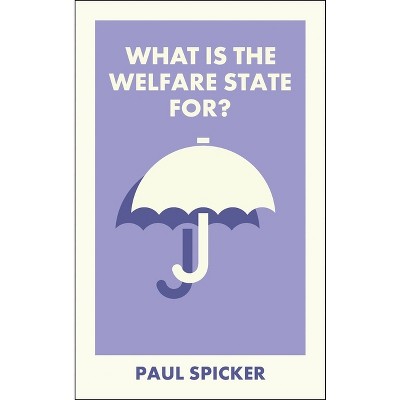Sponsored

Welfare in Ireland - by Michel Peillon (Hardcover)
In Stock
Sponsored
About this item
Highlights
- Employing the conceptual framework elaborated by Pierre Bourdieu, Peillon provides a unified analysis of social welfare institutions and practices in Ireland.
- About the Author: MICHEL PEILLON teaches Sociology at the National University of Ireland, Maynooth.
- 208 Pages
- Political Science, Public Policy
Description
About the Book
Employing the conceptual framework elaborated by Pierre Bourdieu, Peillon provides a unified analysis of social welfare institutions and practices in Ireland. In an effort to offer an overview of the forces that have shaped and continue to influence the Irish welfare system, the author examines the actions and approaches taken by various actors involved in social welfare policy making, including the Catholic Church, the State, trade unions, employers' organizations, and feminist movements. Peillon also incorporates comparative issues that continue to impact on the way welfare systems develop and react to changes. While the focus of the work is on the struggles and developments in the Irish welfare system, this case study provides a framework for examining welfare efforts in general, and should, therefore, appeal to anyone interested in social welfare systems and policies.
This unique examination of welfare in Ireland is organized into two parts. Part I focuses on the collective actors in the welfare field and lays the theoretical framework for the sociological analysis used throughout the work. Part II considers the dynamics resulting from the practices and strategies of the various actors. The chapters in the second part of the book endeavor to understand the dynamics of the welfare field which are triggered by the struggle between the main actors. Examining the relative strengths and weaknesses of these actors, in conjunction with their resources and goals, the author illustrates how the current welfare system has developed and changed as a result.
Book Synopsis
Employing the conceptual framework elaborated by Pierre Bourdieu, Peillon provides a unified analysis of social welfare institutions and practices in Ireland. In an effort to offer an overview of the forces that have shaped and continue to influence the Irish welfare system, the author examines the actions and approaches taken by various actors involved in social welfare policy making, including the Catholic Church, the State, trade unions, employers' organizations, and feminist movements. Peillon also incorporates comparative issues that continue to impact on the way welfare systems develop and react to changes. While the focus of the work is on the struggles and developments in the Irish welfare system, this case study provides a framework for examining welfare efforts in general, and should, therefore, appeal to anyone interested in social welfare systems and policies.
This unique examination of welfare in Ireland is organized into two parts. Part I focuses on the collective actors in the welfare field and lays the theoretical framework for the sociological analysis used throughout the work. Part II considers the dynamics resulting from the practices and strategies of the various actors. The chapters in the second part of the book endeavor to understand the dynamics of the welfare field which are triggered by the struggle between the main actors. Examining the relative strengths and weaknesses of these actors, in conjunction with their resources and goals, the author illustrates how the current welfare system has developed and changed as a result.Review Quotes
"Peillon's account of the Irish welfare field, reveals an innovative and impressive application of theory. Peillon's analysis role of the Catholic Church in influencing social welfare policy in Ireland is particularly interesting at at time that religious involvement in social welfare is again being recognized and appreciated....[E]ssential reading for anyone engaged in international and comparative social welfare today."-Journal of Sociology and Social Welfare
?[t]his book will be taken as an important contribution to the theoretical and empirical scholarship on welfare in Ireland and elsewhere, for that is how it deserves to be received.?-Sociology
?By focusing sociological attention on the multiple players in the welfare field and the differentiated and relational character of their competitive struggles, Peillon's book offers a vibrant and complex analysis of the sociology of welfare. This book should be of interest to graduate students and scholars studying social policy or Irish society; any serious reader who seeks a deeper understanding of social institutions and of how they work in particular sociohistorical contexts will find much to appreciate...?-American Journal of Sociology
?Peillon's account of the Irish welfare field, reveals an innovative and impressive application of theory. Peillon's analysis role of the Catholic Church in influencing social welfare policy in Ireland is particularly interesting at at time that religious involvement in social welfare is again being recognized and appreciated....[E]ssential reading for anyone engaged in international and comparative social welfare today.?-Journal of Sociology and Social Welfare
?Peillon's serious consideration of central European models of social insurance are welcome and are discussed in the context of an exit from liberal welfare parsimony. The book manages to be scholarly, interesting and, importantly, easy to read.?-Irish Journal of Sociology
?This book is to be welcomed as a significant addition to Irish social policy literature. It presents a clear and detailed account of the various sectors of the Irish welfare system. It will become a core text for students of Irish social policy.?-Social Policy
"Ýt¨his book will be taken as an important contribution to the theoretical and empirical scholarship on welfare in Ireland and elsewhere, for that is how it deserves to be received."-Sociology
"[t]his book will be taken as an important contribution to the theoretical and empirical scholarship on welfare in Ireland and elsewhere, for that is how it deserves to be received."-Sociology
"Peillon's serious consideration of central European models of social insurance are welcome and are discussed in the context of an exit from liberal welfare parsimony. The book manages to be scholarly, interesting and, importantly, easy to read."-Irish Journal of Sociology
"This book is to be welcomed as a significant addition to Irish social policy literature. It presents a clear and detailed account of the various sectors of the Irish welfare system. It will become a core text for students of Irish social policy."-Social Policy
"By focusing sociological attention on the multiple players in the welfare field and the differentiated and relational character of their competitive struggles, Peillon's book offers a vibrant and complex analysis of the sociology of welfare. This book should be of interest to graduate students and scholars studying social policy or Irish society; any serious reader who seeks a deeper understanding of social institutions and of how they work in particular sociohistorical contexts will find much to appreciate..."-American Journal of Sociology
About the Author
MICHEL PEILLON teaches Sociology at the National University of Ireland, Maynooth./e He has written extensively on many aspects of Irish society and had been published in many Irish and international journals. He has authored or edited four other books.










